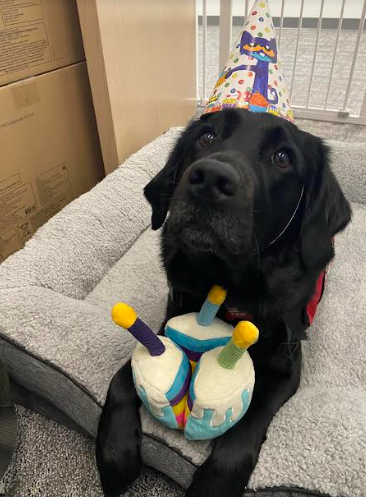Facility Dog & Child Life Program

MIDB's Certified Child Life Specialist (CCLS), Cala Hefferan, works within our pediatric setting to promote patient and family-centered care. Child life professionals actively engage in implementing evidence-based best practices when supporting patients and families.
In alignment with evidence-based best practices, one modality of Cala’s work at MIDB is working with our facility dog, Jersey, and serving as Jersey's primary handler. Cala's CCLS colleague, Ann Kjolhaug, is Jersey's secondary handler.
What is a facility dog?
Jersey is a facility dog, meaning she has had extensive training as an assistance dog. As an assistance dog, Jersey has been trained by Can Do Canines staff, an accredited member of Assistance Dogs International, in skill-training since she was a puppy. As a facility dog, Jersey is trained to work at a designated location, MIDB, with Cala and Ann.
Facility dogs are not emotional support animals or therapy dogs. Facility dogs, like any type of assistance dogs, are skilled-trained/task-trained. Therapy dogs or emotional support animals are not expected to be task trained; they typically provide comfort to an individual by being touched or petted by others.
Jersey is the third facility dog to join the NutriSource BARK Buddies Facility Dog program in the M Health Fairview System. The NutriSource BARK Buddies Facility Dog program is supported by community partners like NutriSource, the program's flagship donor, and NetSPI, our partner that supports Jersey's work at MIDB.
How does the Child Life Program at MIDB work?
The Child Life Program at MIDB is a referral-based program serving children and families at MIDB. When responding to referrals placed for child life services at MIDB, Cala and Ann will assess with family, child, and staff if integrating Jersey into the intervention to support the identified clinical and/or therapeutic goals will support the child's and family's needs.
Some examples of CCLS interventions with Jersey may include:
- Meeting a child and family in the lobby to build rapport and normalize the environment
- Motivating movement and support transitions
- Engaging in medical play with CCLS by helping to demonstrate steps of procedures and tasks such as a lab draw, ECG, EEG, MRI or DXA scan
- Providing alternate focus and sensory support during a procedure or other stressful experience
- Modeling social interactions such as playing ball, cleaning up toys together, and snuggling to provide gentle pressure
If Jersey is tired and needs to rest or if her supporting the child and family is not supportive of the patient or family, then Jersey will take a break while Cala or Ann provides child life services.